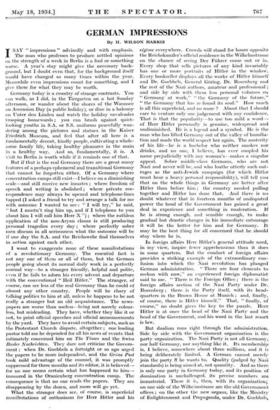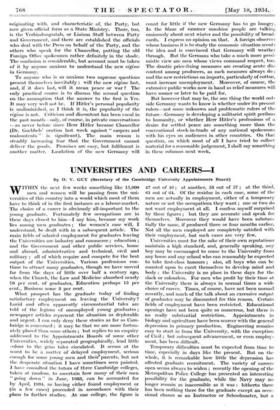GERMAN IMPRESSIONS
By H. WILSON HARRIS
y SAY " impressions " advisedly and with emphasis. I The man who professes to produce settled opinions on the strength of a week in Berlin is a fool or something worse. A year's stay might give the necessary back- ground, but I doubt even that, for the background itself would have changed so many times within the year. Meanwhile even impressions count for something, and I give these for what they may be worth.
Germany today is a country of strange contrasts. You can walk, as I did, in the Tiergarten on a hot Sunday afternoon, or wander about the shores of the Wannsee on Ascension Day (a public holiday), or dine in a balcony on Unter den Linden and watch the holiday cavalcades trooping homewards ; you can brush against quiet- looking youths in S.A. or S.S. uniforms peacefully wan- dering among the pictures and statues in the Kaiser Friedrich Museum, and feel that after all here is a fundamentally decent, kindly people, cultivating a whole- some family life, taking healthy pleasures in the main in a healthy way. And so, fundamentally, it is. A visit to Berlin is worth while if it reminds one of that.
But if that is the real Germany there are a great many features of a perhaps ephemeral and transitional Germany that cannot be forgotten either. Of a Germany where concentration camps still exist—I believe on a diminishing scale—and still receive new inmates ; where freedom of speech and writing is abolished ; where private cor- respondence may always be opened and telephone-lines tapped (I asked a. friend to try and arrange a talk for me with someone I wanted to see : " I will try," he said, " but I mustn't ring him up, and if I telephone to you about him I will call him Herr X ") ; where the ruthless application of the non-Aryan clause is still producing personal tragedies every day ; where perfectly sober men discuss in all seriousness what the outcome will be if one day the S.A. and the Reichswehr find themselves in action against each other.
I want to exaggerate none of these manifestations of a revolutionary Germany. The essential fact is not any one of them or all of them, but the German people going about its normal daily work in a perfectly normal way—to a stranger friendly, helpful and polite, even if he fails to adorn his every advent and departure with the conventional " Heil Hitler." The stranger, of course, can see less of the real Germany than he could of almost any other country. People will be chary of talking politics to him at all, unless he happens to be not really a stranger but an old acquaintance. The news- papers are worse than useless—being not merely colour- less, but misleading. They have, whether they like it or not, to print official speeches and official announcements by the yard. They have to avoid certain subjects, such as the Protestant Church dispute, altogether ; one leading pastor told me he depended for all his news of events that intimately concerned him on The Times and the Swiss Basler Nachriehten. They dare not criticize the Govern- ment ; when Dr. Goebbels a fortnight or so ago urged the papers to' be more independent, and the Crane Post took mild advantage of the counsel, it was promptly suppressed for three months and its editor, it is believed— for no one seems certain what has happened to him— immured in the Oranienberg concentration camp. The consequence is that no one reads the papers. They are disappearing by the dozen, and more will go yet. What the stranger does see, of course, is superficial manifestations of enthusiasm for Herr Hitler and his regime everywhere. Crowds will stand for hours opposite the Reichskanzler's official residence in the Wilhelmstrasse on the chance of seeing Der Fiihrer come out or in. Every shop that sells pictures of any kind invariably has one or more portraits of Hitler in the window. Every bookseller displays all the works of Hitler himself and Dr. Goebbels, General Goring, Dr. Rosenberg and the rest of the Nazi authors, amateur and professional ; and side by side with them less personal volumes on " Germany at work," " the Germany of the future," " the Germany that has re-found its soul." How much is all this superficial, and no more ? About that I should care to venture only one judgement with any confidence. That is that the popularity—to use too mild a word— of Herr Hitler personally is genuine, widespread and undiminished. He is a legend and a symbol. He is the man who has lifted Germany out of the valley of humilia- tion and made the world respect her again. The austerity of his life—he is a bachelor who neither smokes nor drinks, and no one, I believe, has ever coupled his name prejudicially with any woman's—makes a singular appeal. Sober middle-class Germans, who are not Nazi and never will be, and who loathe utterly such out- rages as the anti-Jewish campaign (for which Hitler must bear a heavy personal responsibility), will tell you that on the whole things in Germany are better after Hitler than before him ; the country needed pulling together and Hitler has done that. And there is no doubt whatever that in fourteen months of undisputed power the head of the Government has gained a great deal in experience and something in moderation. If he is strong enough, and sensible enough, to make gradual but drastic changes in his immediate entourage it will be the better for him and for Germany. It may be the best thing for all concerned that he should stay where he is.
In foreign affairs Herr Hitler's general attitude need, in my view, inspire fewer apprehensions than it does in some quarters. But the conduct of foreign affairs provides a striking example of the extraordinary con- fusion into which the Nazi revolution has plunged German administration. " There are four elements to reckon with now," an experienced foreign diplomatist said to me. " There is the Foreign Office ; there is the foreign affairs section of the Nazi Party under Dr. Rosenberg ; there is the Party itself, with its head- quarters in the Brown House at Munich ; and, finally, of course, there is Hitler himself." That, " finally, of course," no doubt gives the key to the puzzle. Herr Hitler is at once the head of the Nazi Party and the head of the Government, and his word in the last resort is law.
But dualism runs right through the administration. Side by side with the Government organization is the party organization. The Nazi Party is not all Germany, nor half Germany, nor anything like it. Its membership is, I believe, somewhere about three millions, and it is being deliberately limited. A German cannot merely join the party If he wants to. Quality (judged by Nazi standards) is being aimed at, not quantity. And as there is only one party in Germany today, and its position of domination is unchallenged, its precise numbers are immaterial. There it is, then, with its organization; on one side of the Wilheimstrasse are the old Government offices ; on the other the new organs, like the Ministry of Enlightenment and Propaganda, under Dr. Goebbels, originating with, and characteristic of, the Party, but now given official form as a State Ministry. There, too, is the Verbindungsstab, or Liaison Staff between Party and Government, and there are established the officials who deal with the .Press on behalf of the Party, and the others who speak for the Chancellor, putting the old Foreign Office spokesmen rather definitely in the shade. The confusion is considerable, but account must be taken of it by anyone anxious to understand the new regime in Germany.
To anyone who is so anxious two supreme questions present themselves inevitably : will the new regime last, and, if it does last, will it mean peace or war ? The only practical course is to discuss the second question on the assumption that the answer to the first is Yes. It may very well-not be. If Hitler's personal popularity is undiminished, as I think it is, the popularity of the regime is not. Criticism and discontent has been vocal in the past month—only, of course, in private conversations —as never before since Herr Hitler became Chancellor (Dr. Goebbels' oration last week against " carpers and malcontents " is significant). The . main reason is steadily increasing fear that the Government cannot deliver the goods. Promises are easy, but fulfilment is another matter. Laudation of the new Germany will count- for little if the new Germany has to go hungry. In the blaze of summer sunshine people are talking ominously about next winter and the possibility of bread- cards. I express no opinion on that. A foreign observer whose business it is to study the economic situation scouts the idea and is convinced that Germany will weather through. But the Germans who take a much more, pessi- mistic view are men whose views command respect, too. The drastic price-fixing measures are creating acute dis- content among producers, as such measures always do ; and the new restrictions on imports, particularly of cotton, must increase uneniployment. Moreover, of course, the extensive public works now in hand as relief measures will have sooner or later to be paid for.
But however that may be, the one thing the world out- side Germany wants to know is whether under its present rulers—not some unknown and problematic rulers of the future—Germany is developing a militarist spirit perilous to humanity, or whether Herr Hitler's professions of a desire for settled peace are something more than the conventional stock-in-trade of any national spokesman with his eyes on audiences in other countries. On that question, on which most of all I have tried to collect material for a reasonable judgement, I shall say something in these columns next week.









































 Previous page
Previous page